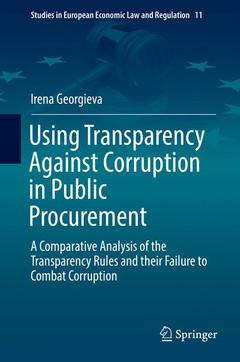Description
Using Transparency Against Corruption in Public Procurement, Softcover reprint of the original 1st ed. 2017
A Comparative Analysis of the Transparency Rules and their Failure to Combat Corruption
Studies in European Economic Law and Regulation Series, Vol. 11
Language: English
Subject for Using Transparency Against Corruption in Public Procurement:
Keywords
Transparency in Public Procurement; EU Public Procurement Legislation; International Organizations Against Corruption; Corruption in Government Procurement; Predisposition to Corruption; Economic Factors for Corruption; Center for the Study of Democracy; Infringements in Procurement Procedures; German Public Procurement System; Optimizing Transparency and Curbing Corruption; Corruption in Public Procurement; Corruption Prevention Legislation; Anti-Corruption Strategies; Centralized Procurement; Award of Public Procurement; Bulgarian Public Procurement System; Austrian Public Procurement System; Public Procurement Directives; Public Procurement Practice; E-Procurement
Publication date: 04-2017
Support: Print on demand
Publication date: 07-2018
Support: Print on demand
Description
/li>Contents
/li>Biography
/li>Comment
/li>
This book examines corruption in public procurement in three Member States of the EU, reviewing their different approaches to combating corruption, and the extent to which the transparency principle is applied in their procurement systems. The focus of the work is on the contrast between the unsuccessful procurement legislation of a relatively young Member State (Bulgaria) and its attempt to curb corruption by expanding the scope of application of the transparency principle, and two examples of procurement systems where corruption is limited adequately, without an excess of information procedural requirements (Germany and Austria).
The book scrutinizes the transparency rules, procurement participants, and responsible institutions in the award of procurements in these countries. It discusses in detail the types of infringements involving corruption as well as their link to infringements of the transparency principle. It compares and examines the systems of control and appeal against a contracting authority's actions within the various legislative schemes, and highlights the legislative weaknesses which fail to reduce corruption. The comparative analysis between the Bulgarian public procurement system and the German and Austrian systems is carried out through detailed research not only with regard to adherence to the transparency principle, but also to the use of other mechanisms to limit corruption, insofar as these solutions are appropriate and could be adapted in other countries currently lacking sufficient anti-corruption measures.
Dr Irena Georgieva is a Bulgarian attorney and expert in public procurement law with over 15 years of practice. Currently she works as a legal advisor and manager of her own niche law office in Sofia focused on public procurement and data protection matters. Dr Georgieva has graduated in law from the Sofia University (Master in Law 2003) and has also a post graduate qualification in accountancy from the University of National and World Economy, Sofia (2005). She obtained her doctoral degree in the University of Groningen, Netherlands (PhD 2015), with dissertation thesis on public procurement law. She takes part in many undertakings related to public procurement matters – round tables, open discussions and seminars - and is also a regular author of public procurement articles published in domestic and international law & business magazines. She is a member of the Sofia Bar Association.
Offers clear suggestions for curbing corruption in procurement
Highlights the corruption loopholes that the new procurement directives might open up
Provides an up to date review and assessment of common EU procurement anti-corruption policies
Discusses the effectiveness of the relevant authorities' action, as well as relevant legislation
Includes a unique rating of procurement infringements which open corruption loopholes but remain transparent
Includes supplementary material: sn.pub/extras




